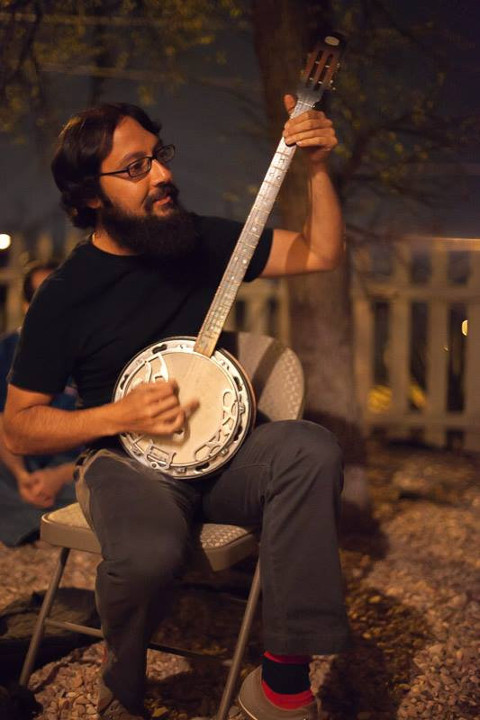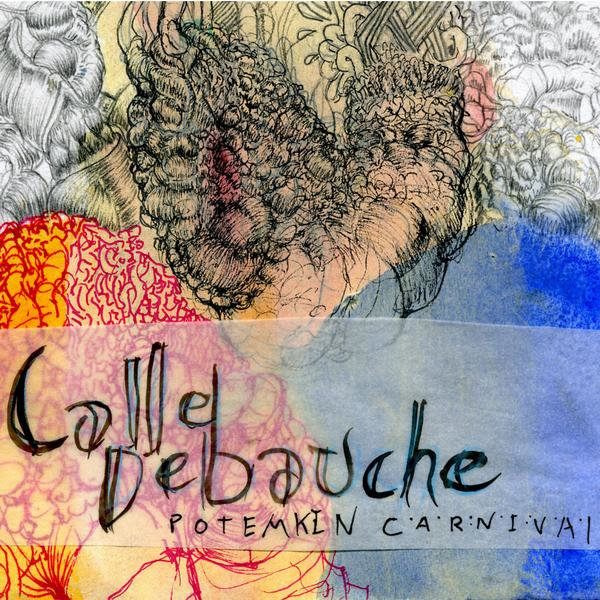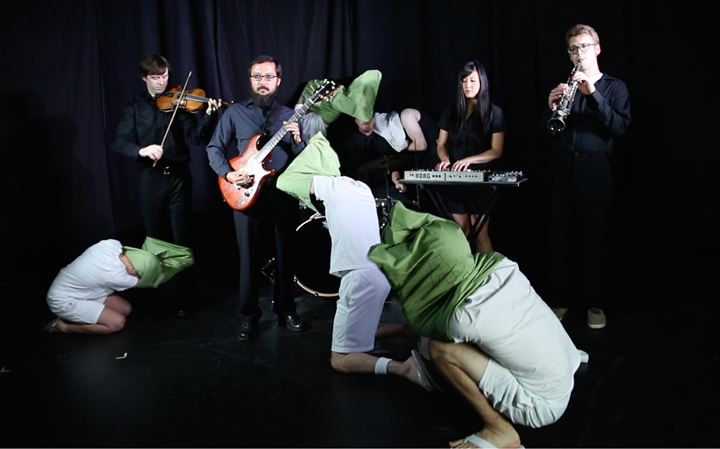
Exposé Online
What's old
Exposé print issues (1993-2011)
- 1 (October 1993)
- 2 (February 1994)
- 3 (May 1994)
- 4 (August 1994)
- 5 (October 1994)
- 6 (March 1995)
- 7 (July 1995)
- 8 (November 1995)
- 9 (March 1996)
- 10 (August 1996)
- 11 (February 1997)
- 12 (May 1997)
- 13 (October 1997)
- 14 (February 1998)
- 15 (July 1998)
- 16 (January 1999)
- 17 (April 1999)
- 18 (November 1999)
- 19 (May 2000)
- 20 (October 2000)
- 21 (March 2001)
- 22 (July 2001)
- 23 (December 2001)
- 24 (April 2002)
- 25 (September 2002)
- 26 (February 2003)
- 27 (August 2003)
- 28 (December 2003)
- 29 (April 2004)
- 30 (September 2004)
- 31 (March 2005)
- 32 (September 2005)
- 33 (May 2006)
- 34 (March 2007)
- 35 (January 2008)
- 36 (October 2008)
- 37 (July 2009)
- 38 (July 2010)
- 39 (Summer 2011)
Features
On Music and Social Identity —
The Stop Motion Orchestra Interview

Stop Motion Orchestra is not a band to be pigeonholed. Pulling together aspects of a wide range of styles and blending them with a healthy sense of fun, their debut album was one of the highlights of 2014. In conjunction with their appearance at the 2016 Voyager Festival, I was able to ask composer Mohadev a few questions to shed light on the band and his numerous other projects.
by Jon Davis, Published 2016-09-08
photography by Josh Robins, Steven Anderson, Parker Lasseigne
 What are your earliest musical memories?
What are your earliest musical memories?
My father is an Indian classical musician, and from a young age I was around that music. We spent our summers at Ali Akbar Khan’s college of music in California, and I would sometimes fall asleep at house concerts. It was a musical household and I was exposed to music (and people) from around the world as a kid.
What kind of formal schooling do you have in music?
I took lots of lessons early on: from my dad when I was four, then violin when I was six, then piano, then trombone in the school band… By the time I was 14, when a friend of mine got a guitar, I was able to figure out some riffs pretty quickly. I took guitar lessons for a bit to learn basic fingering and chords, but by the time I started playing guitar I had a pretty good ear, so mostly I learned by playing along with my favorite albums, which as a teenager meant lots of metal, some prog, and stuff like Sonic Youth and Fugazi. I took a semester of jazz guitar lessons and two semesters of basic music theory in college, and they were helpful, but by that point I was pretty set on my own course.
How did your conception of music develop in your life?
After all the lessons as a kid I thought of music as a chore, and kind of hated it! It wasn’t until I got into metal as a teenager that I started playing and listening to music for fun. I grew up in a pretty small, conservative city in Texas, and when I was old enough to go to bigger cities and see real metal shows I realized pretty quick that I would never fit in with that scene. That was maybe a tough realization at the time, but I think it helped to remove my interest in music from a social identity, which freed me up to explore all kinds of music. I started listening to everything interesting that I could get my hands on, which, not surprisingly, included a lot of 70s prog. I got turned on to improvisation via Fred Frith, and discovering Anthony Braxton’s explosion of creative music ideas in the 70s was a revelation. Another major piece for me is the band Cardiacs, who I first heard in 2004. I was at the point in life where popular music was starting to lose its magic (when you start realizing that you aren’t going to always have those profound, overwhelming emotional experiences with albums that you had when you were 15), and Cardiacs really restored my excitement in music and made me feel like a kid again. Among other things.
 While absorbing lots of music I was also playing guitar in different bands, but what I wanted to do was usually a little too weird for my bandmates. At some point I decided to stop bothering with trying to start writing and recording my own music. This led to Earth Size Diamonds, which was just me with a drum machine, keyboard, banjo, and a few guitars. From there I guess the logical next step was to write music for a band to play, and I started doing that with Calle Debauche around 2007.
While absorbing lots of music I was also playing guitar in different bands, but what I wanted to do was usually a little too weird for my bandmates. At some point I decided to stop bothering with trying to start writing and recording my own music. This led to Earth Size Diamonds, which was just me with a drum machine, keyboard, banjo, and a few guitars. From there I guess the logical next step was to write music for a band to play, and I started doing that with Calle Debauche around 2007.
When you formed Stop Motion Otchestra, did you have the instrumentation in mind and then find people to fit in, or did you find the musicians first and tailor the music to fit them?
I originally had this idea for it to be a kind of continuation of Calle Debauche, with drums, tuba, guitar, and clarinet. When Alden said he was interested in playing violin it went in a different direction. We’ve been through some variations in lineup since then (he and I have been playing together since 2009), but its almost always been soprano sax and violin up front.
After listening to pop and rock music for decades, I can’t help but notice that the vast majority of music is created exclusively by “boys with guitars.” Do you consciously go against that grain?
Well, as far as I can tell I’m a boy with a guitar! ;-) In short, no. The current lineup of the band is really the best people for each part, and they also happen to be some of the best people.
I have some ideas about why most bands end up looking the same, but thats probably a topic for another discussion!
SMO’s music has many similarities with bands associated with the RIO style (Univers Zero, Thinking Plague, and so on). How familiar are you with that scene?
That music is very important to me. After wearing out Yes and Gentle Giant albums, I was really excited to discover Henry Cow, Stormy Six, Samla Mammas Manna, and a lot of the bands that were related or came after: Albert Marcoeur, Debile Menthol, Aksak Maboul, The Work, Fred Frith’s 80s albums. Also the American bands Thinking Plague, Doctor Nerve, Cartoon, 5uu’s, and Banda Elastica, Decibel, Miriodor, etc etc etc.
We invited Thinking Plague here earlier this year, and playing with them was a huge honor and a wonderful experience. Their performances exceeded all of my expectations, and they were very kind and down to earth people. It was also nice to get some positive feedback from people whose music has been a constant in my life for a long time.
 Instant Everything! sounds like it’s all composed. Do you incorporate any improvisation in your music?
Instant Everything! sounds like it’s all composed. Do you incorporate any improvisation in your music?
Aside from a few solos here and there it is composed. We have done a little group improvisation at live performances, but not too much. I love improvised music, but I tend to keep improvisation and composition separate for some reason. We do incorporate some extended techniques, which I first came across in improvised music, on our recordings. There might be a little bit of recorded improvisation on the next album too.
It’s been a couple of years since Instant Everything! came out. I see on your Facebook page that something new is in the works — how’s it going? When can we expect it to come out? Are there any changes from the first album?
Its coming along! We have three tunes just about done, and they sound really great, if I may say so myself.
We had two members leave the band after Instant Everything! came out, and I got a little cocky and asked the best musicians I know of in Austin to replace them, and they all said yes! The instrumentation is more diverse, and the compositions are a little more involved. I was kind of trying to beat people over the head with the writing on Instant Everything!, and some of the newer material unfolds at a more natural pace, and gets into some subtler emotional spaces. While not exactly “about” anything, there are a few songs where the mood/emotion I’m trying to convey has a spiritual dimension to it.
I have a dedicated space for recording and mixing now (the first album was recorded at friends’ houses and mixed in my apartment living room), and I have a great audio engineer helping me get the sonics right. I think the next album will be a step up in every department, and people who liked Instant Everything! will dig it. I’ve learned not to throw out dates, but I’m actively working on it!
 Aside from SMO, do you have any other musical activities?
Aside from SMO, do you have any other musical activities?
Yes, I play a lot. Some currently active projects:
Jibber & Twitch — a tribute to Cardiacs! This is a new project, basically trying to help spread the word and celebrate my favorite rock band.
Terraformation — ongoing recording project by myself and percussionist Ben DeGain. Its a kind of spacey / post-rock / desert music with vibraphone. We are working on new material.
Sam Arnold and the Secret Keepers — Sam is an amazing Austin musician who leads the band Opposite Day, and this is a vehicle for his songwriter side. This band shares three members with SMO (Sam, Leila, and myself) but sounds totally different. I played some guitar solos that I’m really proud of on the new album, which should be out soon. He has several albums available on Bandcamp.
Obnosticon — a dual guitar hard rock / metal band with some proggy elements. This band is led by my friend Mark, who is a great guitarist, and it also features SMO drummer Charlie Duncan.
I also sometimes play in my girlfriend’s psychedelic party improv group Ouiness, and have an improvising trio that will be putting out an album and playing around Austin soon.
 How does a non-mainstream band like SMO operate in today’s world? Day jobs? Grants? Patrons? Crowd-funding?
How does a non-mainstream band like SMO operate in today’s world? Day jobs? Grants? Patrons? Crowd-funding?
We all do other stuff, this is mostly a labor of love. We really appreciate it when people buy our music, come to shows, and tell people about us.
Austin is generally known for music more in the blues-country-folk-rock vein than what you do. What’s it like as a band outside that stylistic area, both for playing live and for getting media attention?
I’m not sure what it looks like from outside, but from my perspective there is a lot going on in Austin. That being said, even in the small, emerging ‘progressive’ scene here we kind of stick out (as we probably would anywhere).
When this band started I didn’t have high expectations as to how we’d be received, but over the past few years we’ve had good turnout at shows and gotten lots of positive feedback. We haven’t had much coverage by local media, but I also haven’t sought it out. For me, its all about making music I’d like to hear. When I do that and other people also like it, I feel like I’ve made a meaningful connection, and thats the real magic. Anything else is just icing on the cake.
Filed under: Interviews
Related artist(s): Stop Motion Orchestra
More info
http://stopmotionorchestra.bandcamp.com
http://www.voyagerfest.org
What's new
These are the most recent changes made to artists, releases, and articles.
- Release: Kevin Kastning & Bruno Råberg - Across Tall Rain
Updated 2026-02-21 00:42:08 - Review: Gary Husband - Postcards from the Past
Published 2026-02-21 - Release: Daniel Crommie - Februa
Updated 2026-02-20 14:23:17 - Artist: Daniel Crommie
Updated 2026-02-20 14:22:43 - Release: b.mez - Under Circuitous Skies
Updated 2026-02-20 14:18:27 - Artist: b.mez
Updated 2026-02-20 14:17:34 - Release: Il Segno del Comando - Sublimazione - Live
Updated 2026-02-20 11:36:17 - Review: Maledictis - Echoes of Conscience
Published 2026-02-20 - Release: Lorenzo Montanà - Velan
Updated 2026-02-19 23:52:26 - Release: Erik Wøllo - Snow Tides
Updated 2026-02-19 23:45:00 - Release: The Forever Moment - A City Singing
Updated 2026-02-19 19:57:54 - Release: The Forever Moment - Here to Stay
Updated 2026-02-19 19:56:27 - Release: Hyper Gal - Our Hyper
Updated 2026-02-19 19:52:48 - Release: Mathieu Torres - Desconegut
Updated 2026-02-19 19:51:59 - Release: Tanya Tagaq - Saputjiji
Updated 2026-02-19 19:50:54 - Release: Jérémie Ternoy Trio - Bloc
Updated 2026-02-19 01:13:48 - Release: Jérémie Ternoy Trio - Bill
Updated 2026-02-19 01:11:05 - Review: Vesuvius - Twisted Tales from Warped Minds
Published 2026-02-19 - Release: Entrance - Entre Dos Mundos
Updated 2026-02-18 16:17:13 - Release: Entrance - Odisea
Updated 2026-02-18 16:16:21
